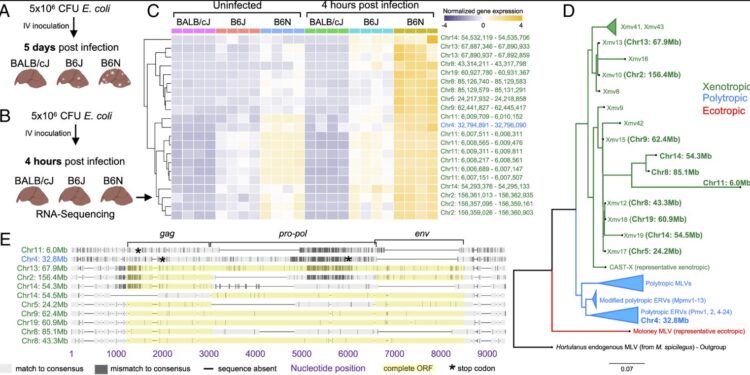ERV expression correlates with susceptibility to abscesses. (A) Pattern of variation in abscess susceptibility in female BALB/cJ, B6J, and B6N mice. (B) Schematic of the RNA sequencing experiment. (C) Normalized Z-score expression of transcripts induced by infection in B6N mice and whose expression correlates with abscess susceptibility. The full dataset, including non-ERV genes, can be found in Datasets S1 and S2. The coordinates come from GRCm38. (D) Maximum likelihood tree of ERV loci associated with and representative of abscesses in B6J. Loci identified in this study are in bold and those identical to previously known loci are in parentheses (e.g., Xmv13 (Chr13: 67.9 Mb)). Four loci lack env and do not correspond to previously known ERVs ( 3 ). For clarity, one xenotropic MLV and several polytropic MLVs are shown as single, folded branches (triangles). (E) Sequence alignment of the 11 abscess-associated MLV loci relative to their consensus. Credit: Proceedings of the National Academy of Sciences (2024). DOI: 10.1073/pnas.2319162121
Bacterial infections can lead to the formation of abscesses, which are pockets of dead cells and debris surrounded by inflammatory immune cells. Bacteria multiply in abscesses, causing more inflammation and additional damage to surrounding tissues. In severe cases, these immune reactions spread throughout the body, leading to life-threatening organ failure, or sepsis. But how these abscesses form and what can be done to prevent them was not yet well understood.
Using preclinical models, Brigham and Women’s Hospital investigators identified a key mechanism that may lead to liver abscess formation: a process known as reverse transcription, in which DNA is synthesized at from RNA.
The article is published in the journal Proceedings of the National Academy of Sciences.
Using RNA sequencing, the researchers examined liver gene transcripts from mice infected with Escherichia coli. They found that abscess formation was associated with increased expression of endogenous retroviruses (ERVs), remnants of viruses integrated into the mouse genome following previous infections.
The authors hypothesized that DNA produced by ERVs may stimulate inflammatory immune responses, which damage surrounding cells and thus lead to the development of abscesses. If so, preventing ERV activity could prevent abscess formation.
To test this, the team treated mice with a cocktail of reverse transcriptase inhibitors – antiretroviral drugs also used to manage HIV infections – to block expression of ERV DNA. They found that a single dose of the inhibitor cocktail was sufficient to prevent abscess formation, if administered quickly after a bacterial infection.
“Our results suggest that medications used to treat HIV may be used to prevent inflammatory complications of bacterial sepsis,” said corresponding author Matthew Waldor, MD, Ph.D., of the Division of Infectious Diseases.
“In mice, susceptibility to abscesses varies by sex and between tissues. So more work is needed to understand how antiretroviral drugs can prevent complications such as bacterial sepsis in different individuals. But our study is promising and opens “the path to a new way of thinking about treating and preventing harmful consequences following a bloodstream infection,” said first author Karthik Hullahalli, a Harvard graduate student in the Waldor Lab at the Brigham.
More information:
Karthik Hullahalli et al, Reverse transcriptase inhibitors prevent liver abscess formation during Escherichia coli bloodstream infection, Proceedings of the National Academy of Sciences (2024). DOI: 10.1073/pnas.2319162121
Provided by Brigham and Women’s Hospital
Quote: Researchers find anti-HIV drugs can prevent complications of bacterial sepsis (January 17, 2024) retrieved January 17, 2024 from
This document is subject to copyright. Except for fair use for private study or research purposes, no part may be reproduced without written permission. The content is provided for information only.



